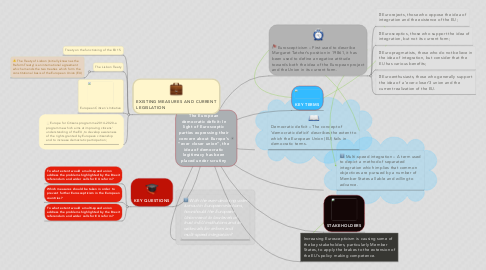The European democratic deficit: In light of Eurosceptic parties expressing their concern about Europe’s “ever closer union”, the idea of democratic legitimacy has been placed under scrutiny
by Andra Teodora

1. EXISTING MEASURES AND CURRENT LEGISLATION
1.1. Treaty on the functioning of the EU15.
1.2. The Lisbon Treaty
1.2.1. The Treaty of Lisbon (initially known as the Reform Treaty) is an international agreement which amends the two treaties which form the constitutional basis of the European Union (EU)
1.3. European Citizen´s Initiative
1.4. Europe for Citizens programme 2014-2020-a programme which aims at improving citizens’ understanding of the EU, to develop awareness of the rights granted by European citizenship and to increase democratic participation;
2. KEY QUESTIONS
2.1. To what extent would a multi-speed union address the problems highlighted by the Brexit referendum and wider calls for EU reform?
2.2. Which measures should be taken in order to prevent further Euroscepticism in the European countries?
2.3. To what extent would a multi-speed union address the problems highlighted by the Brexit referendum and wider calls for EU reform?
3. With the ever-declining voter turnout in European elections, how should the European Union react to low levels of trust in EU institutions and to wide calls for reform and multi-speed integration?
4. Euroscepticism – First used to describe Margaret Tatcher’s position in 19861, it has been used to define a negative attitude towards both the idea of the European project and the Union in its current form.
4.1. Eurorejects, those who oppose the idea of integration and the existence of the EU;
4.2. Eurosceptics, those who support the idea of integration, but not its current form;
4.3. Europragmatists, those who do not believe in the idea of integration, but consider that the EU has various benefits;
4.4. Euroenthusiasts, those who generally support the idea of a ‘ever-closer’3 union and the current realization of the EU.
5. KEY TERMS
6. Democratic deficit – The concept of ‘democratic deficit’ describes the extent to which the European Union (EU) fails in democratic terms.
7. Multi-speed integration – A term used to depict a method of separated integration which implies that common objectives are pursued by a number of Member States all able and willing to advance.
8. STAKEHOLDERS
9. Increasing Euroscepticism is causing some of the key stakeholders, particularly Member States, to apply the brakes to the extension of the EU’s policy making competence.


